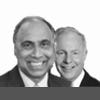The Struggle for America’s Head, Heart and Soul
Since the beginning of this year, there have been a spate of books such as Michael Wolff’s Fire and Fury; David Cay Johnston’s It’s Even Worse than You Think; and James Comey’s A Higher Loyalty that “spill the beans” on Donald Trump. While entertaining reads, they do not provide much insight into the future of this democracy.
Three new books released within the past few months do so — because they provide perspectives on the ongoing struggle for America’s head, heart and soul. They are: Michael Hayden’s The Assault on Intelligence: American National Security in an Age of Lies, Jonah Goldberg’s Suicide of the West: How the Rebirth of Tribalism, Populism, Nationalism, and Identity Politics is Destroying American Democracy, and Jon Meacham’s The Soul of America: The Battle for Our Better Angels.
These books and authors make us think about who we are as a country, where we are going, and what we must do to prevail in this struggle. Although their focus is different, the overriding theme of each of these works and writers is the same.
That is the answer to winning these three fights must come from the “us” in USA. The citizens must stand and deliver in order to give leaders the opportunity to follow them.
In a marvelous op-ed for the New York Times titled “The End of Intelligence,” Michael Hayden, former director the Central Intelligence Agency and the National Security Agency, provides a gloomy picture of the nation’s current condition in the intelligence domain.
Hayden specifically addresses intelligence and national security under President Trump. But what he says transcends the security realm and applies to our national intellect in general.
Hayden comments that we are living in a “post-truth world.” After that, he quotes from historian Timothy Snyder’s pamphlet, “On Tyranny”:
To abandon facts is to abandon freedom. If nothing is true, then no one can criticize power because there is no basis upon which to do so. Post-truth is pre-fascism.
Jonah Goldberg provides an experiential contrast to Hayden. He is a journalist who holds a chair at the American Enterprise Institute, is a senior editor at the National Review, and writes a nationally syndicated column.
In spite of their career differences, Hayden and Goldberg share similar concerns about what they see in America today. Where Hayden looks at the head in his book, Goldberg looks at the heart in his.
What he sees is a heart of darkness, and that heart tends to separate us rather than bringing us together. As he puts it, “The pull of the tribe is inscribed on every human heart and it can take highly sophisticated and intellectual forms.”
He asserts that that our tribal state was overcome by a Miracle created about three hundred years ago by the combination of liberalism and capitalism and the “United States is the fruit of the Miracle.” Then along come corruption, which is the “desire to our authentic selves,” and ingratitude, which is the majority of Americans being “ungrateful for what the Miracle has brought us.” And due to these twin forces, we see the tribalism that is pervading the U.S. today.
Goldberg’s broad prescription for defeating these forces is a re-commitment to capitalism and a civil society. He puts his economic faith in capitalism and his personal faith in “a healthy civil society, not the state, that civilizes people.” A civil society is the antidote for the tribalism that is our human nature.
Goldberg wants us to vanquish our devils within. By contrast, Jon Meacham encourages us to remember our better angels.
Meacham is a historian and a Pulitzer Prize winning biographer of presidents. In his new book, The Soul of America, he manages to see the rays of sunshine reflected in our nation’s checkered past that should give us hope for the future.
Meacham examines the leadership roles that Presidents have played to help overcome periods of racial, political, partisan and civic tension. He cites numerous examples of actions and decisions by presidents from George Washington through Andrew Jackson, Teddy Roosevelt, Franklin Delano Roosevelt and Harry Truman to Lyndon Baines Johnson to illustrate the country has faced crises and challenges throughout our history that have made a difference in moving the country toward a “more perfect union.”
It’s not just our leaders, however, that have made that difference. In fact, as Meacham noted in an interview on NPR’s Fresh Air on May 2:
“Our best moments have come when voices far from power –reformers, protesters, those who have been on the margins — have forced the powerful to take notice…our finest hours have come when presidential power has intersected with voices of protest to take us to higher ground.”
Meacham reminds us that we are all in this — or should be in this together. As Benjamin Franklin advised us after signing the Declaration of Independence in 1776, “We must indeed, all hang together, or indeed we shall all hang separately.”
In this divisive environment, where there is such a struggle for the head, heart and soul of America, it is time for each and every one of us to look in the mirror, and to ask what am I doing now, and what can I do as a citizen, to bring us together in a manner that promotes the truth, our civil society, and our better angels.
Asking that question does not give us answers nor ensure productive actions. Failing to ask it, however, means the struggle for the future of our American democracy is over and it will be time to write its obituary.
